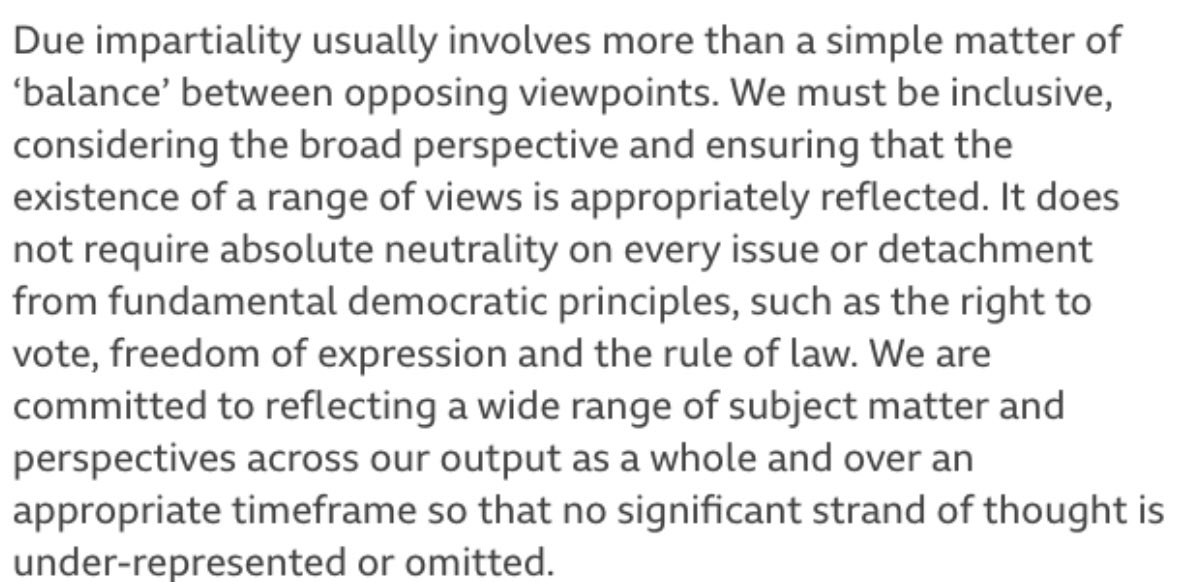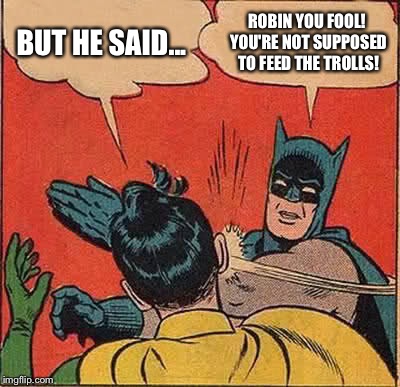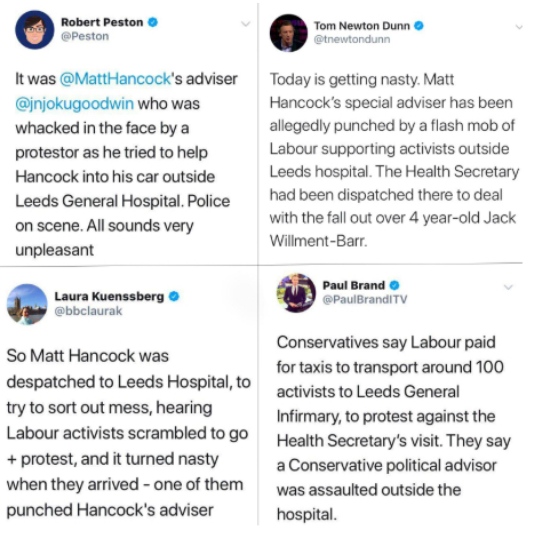Are the BBC’s new social media guidelines as draconian as has been reported? Looking at the actual guidelines it isn’t quite so clear cut. THREAD! https://www.bbc.com/editorialguidelines/guidance/individual-use-of-social-media">https://www.bbc.com/editorial...
2/ The guidance makes a good point for the need to stay out of an increasingly polarised environment, but then it makes the mistake of ambiguously describing impartiality as “reflecting all viewpoints”...
3/ ...There is no mention of “due impartiality” and it’s worth highlighting that this guidance should be combined with BBC guidance on impartiality https://www.bbc.co.uk/editorialguidelines/guidelines/impartiality">https://www.bbc.co.uk/editorial...
4/ It’s  https://abs.twimg.com/emoji/v2/... draggable="false" alt="😔" title="Nachdenkliches Gesicht" aria-label="Emoji: Nachdenkliches Gesicht"> to see a US-style approach adopted of being concerned with how journalists *appear* rather than what they *do* with “an obligation to ensure that the BBC’s editorial decisions are not perceived to be influenced by any personal interest or bias.”
https://abs.twimg.com/emoji/v2/... draggable="false" alt="😔" title="Nachdenkliches Gesicht" aria-label="Emoji: Nachdenkliches Gesicht"> to see a US-style approach adopted of being concerned with how journalists *appear* rather than what they *do* with “an obligation to ensure that the BBC’s editorial decisions are not perceived to be influenced by any personal interest or bias.”
5/ ...Instead or focusing on appearances and accepting others’ perceptions as fact, why not work on recommending journalists are more transparent about how they ensure impartiality in their *methods* (to debunk those perceptions)
6/ ...This approach is mirrored later on with “there is no difference between how a personal and an ‘official’ account is perceived on social media”.
What evidence is there for this? And shouldn’t more be done to correct that perception (it is, after all, wrong)?
What evidence is there for this? And shouldn’t more be done to correct that perception (it is, after all, wrong)?
7/ ...Now we come to a big one: “Don’t criticise your colleagues in public.” It comes as a straight command with no justification, no room for interpretation, and no caveats. Criticism is often justified, and can be constructive. If any line was ill-judged, this is it.
8/ There& #39;s a recognitiion of the rising abuse faced by journalists in “Do always treat others with respect, even in the face of abuse” — but this offers little support for the journalists facing such abuse.
9/ The BBC guidance to “assume anything you say or post will be viewed critically” *doesn’t* say the employee should *not* tweet — this is basically another way of saying "consider the audience" and is sound advice. https://www.bbc.com/editorialguidelines/guidance/individual-use-of-social-media">https://www.bbc.com/editorial...
10/ ...Likewise, the BBC guidance doesn’t *stop* people using hashtags/liking/sharing.
It only recommends that journalists “think about what your likes, shares, retweets, use of hashtags and who you follow say about you, your personal prejudices and opinions.”
Or does it?
It only recommends that journalists “think about what your likes, shares, retweets, use of hashtags and who you follow say about you, your personal prejudices and opinions.”
Or does it?
11/ ...Well, later it does say “Do not support campaigns, (eg. by using hashtags) no matter how apparently worthy the cause or how much their message appears to be accepted or uncontroversial.”
The difference? A hashtag can be a number of things, including campaigns.
The difference? A hashtag can be a number of things, including campaigns.
12/ The BBC guidance recommends treating private groups as public — again, good advice. There is no such thing as a private group or personal account on social media when you are a journalist.
13/ A couple of sections of the BBC guidance acknowledge the dangers of echo chambers and how our feeds are algorithmically filtered. In fact, it should probably go further in urging reporters to seek out different voices.
14/ Especially welcome are a couple of sections that emphasise the importance of clear writing and attribution on social — broadcast journalists have too often been guilty of sloppy writing on this front. I teach my MA students at @BCUJournalism explicitly about this issue
15/ For an example of the sort of sloppy social writing relevant to that guideline, look at tweets during the 2019 election about an "assault" on a political adviser. Many failed to accurately communicate that these were claims and hadn& #39;t been confirmed
16/ ...Ditto warnings about tweets requiring "careful thought and editorial discipline.” and “thinking about the language you are using or how it could be perceived.”
17/ One worrying theme in the BBC guidelines relates to factchecking/debunking:
“Do be careful with rebuttals – they can feed conflict.”
Should the desire to avoid conflict override the need to tell the truth? It& #39;s not a simple answer: https://www.brookings.edu/techstream/when-are-readers-likely-to-believe-a-fact-check/">https://www.brookings.edu/techstrea...
“Do be careful with rebuttals – they can feed conflict.”
Should the desire to avoid conflict override the need to tell the truth? It& #39;s not a simple answer: https://www.brookings.edu/techstream/when-are-readers-likely-to-believe-a-fact-check/">https://www.brookings.edu/techstrea...
⓵⓼/ Another big one: “Use of emojis can – accidentally, or deliberately – undercut an otherwise impartial post.”
Misinterpreted as an https://abs.twimg.com/emoji/v2/... draggable="false" alt="⛔️" title="Nicht betreten" aria-label="Emoji: Nicht betreten">-emoji guideline, it does not say *not* to use emoji: it& #39;s simply advising understanding how to use them effectively and accurately.
https://abs.twimg.com/emoji/v2/... draggable="false" alt="⛔️" title="Nicht betreten" aria-label="Emoji: Nicht betreten">-emoji guideline, it does not say *not* to use emoji: it& #39;s simply advising understanding how to use them effectively and accurately.
Misinterpreted as an
19/ ...Now we come to the VIRTUE SIGNALLING:
“Avoid ‘virtue signalling’ – retweets, likes or joining online campaigns to indicate a personal view”
The most curious part of this is the use of ‘virtue signalling’ — there’s no need to use this loaded term. It& #39;s a waste of 2 words
“Avoid ‘virtue signalling’ – retweets, likes or joining online campaigns to indicate a personal view”
The most curious part of this is the use of ‘virtue signalling’ — there’s no need to use this loaded term. It& #39;s a waste of 2 words
20/  https://abs.twimg.com/emoji/v2/... draggable="false" alt="🤦" title="Person facepalming" aria-label="Emoji: Person facepalming">Ironically the use of "virtue signalling" in the BBC guidance serves as a perfect example of the sloppiness of writing that the guidance itself advises against.
https://abs.twimg.com/emoji/v2/... draggable="false" alt="🤦" title="Person facepalming" aria-label="Emoji: Person facepalming">Ironically the use of "virtue signalling" in the BBC guidance serves as a perfect example of the sloppiness of writing that the guidance itself advises against.
The result? It& #39;s undermined perceptions of the BBC& #39;s impartiality.
Very meta.
The result? It& #39;s undermined perceptions of the BBC& #39;s impartiality.
Very meta.
Extra notes on the thread about the BBC guidelines on social media use: good point about hashtags from @adambanksdotcom: they can be used as a distribution method, not just to express & #39;something I support& #39; (and in other ways too) https://twitter.com/adambanksdotcom/status/1322167190901215238">https://twitter.com/adambanks...
...and @kellyfincham points out the difficulty of putting the BBC guidelines into industry context https://twitter.com/kellyfincham/status/1322188256344182785">https://twitter.com/kellyfinc... - research by @MichOpgenhaffen helps: https://twitter.com/MichOpgenhaffen/status/1322168973497163778">https://twitter.com/MichOpgen...
...However, you can read the @Channel4News social media guidelines here: https://www.channel4.com/producers-handbook/c4-guidelines/social-media-guidelines">https://www.channel4.com/producers... and for @SkyNews (PDF: section 23, p28) https://news.sky.com/docs/sky_news_editorial_guidelines.pdf">https://news.sky.com/docs/sky_...

 Read on Twitter
Read on Twitter













